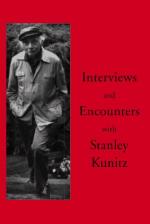|
This section contains 7,764 words (approx. 26 pages at 300 words per page) |

|
SOURCE: “Stanley Kunitz: The Stubborn Middle Way,” in Modern Poetry Studies, Vol. 6, No. 1, Spring, 1975, pp. 49–73.
In the following essay, Weisberg provides an overview of Kunitz's artistic development and poetic style, drawing attention to his metaphysical concerns, creative vision, and the influence of T. S. Eliot and W. A. Auden.
“The easiest poet to neglect is one who resists classification.”1 Had he spoken of himself, Stanley Kunitz might rather have said that we neglect the poet who becomes classified too early and too narrowly. Since a brief, if sympathetic, article by Jean Hagstrum in 1958,2 Kunitz's impressive canon has aroused no critical interest. Instead, he has been dubiously honored, by almost universal agreement, as a strange phenomenon called the “poet's poet,” and the only recent study of him, by Marjorie Perloff in the Iowa Review, explicitly sustains this official view.3 In what sense is Kunitz “the poet's poet”? The title...
|
This section contains 7,764 words (approx. 26 pages at 300 words per page) |

|


